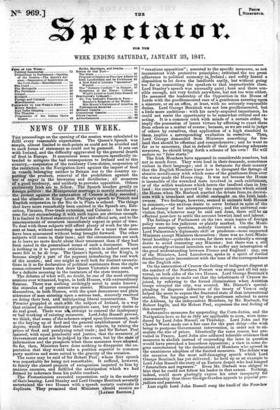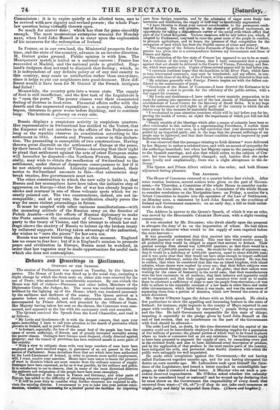NEWS OF THE WEEK.
THE proceedings on the opening of the session were calculated to fulfil every reasonable expectation. The Queen's Speech was simple, almost limited to such points as could not be avoided and to such forms of statement as could not be gainsaid. It sets out with Ireland, and the difficulty aggravated by the general dearth of food in Europe. It announces some measures specifically in- tended to mitigate the bad consequences to Ireland and to this country,—suspension of the residuary Corn-duties, suspension of the restriction in the Navigation-laws against the import of food in vessels belonging neither to Britain nor to the country ex- porting the produce, removal of the prohibition against the use of sugar in the breweries and distilleries ; all measures of a good tendency, and unlikely to provoke opposition. Others exclusively Irish are to follow. The Speech touches gently on foreign politics : the Montpensier marriage is merely mentioned ; the protest against tbe annexation of Cracow is.duly recorded ; and the allusion in King Louis Philippe's speech to French and English cooperation in the Rio de la Plata is echoed. The things that have more remarkably been omitted in the Speech are, Edu- cation, Finance, Free-trade extension, and Colonies : but the rea- sons for not encumbering it with such topics are obvious enough. It is limited to formal statements of fact and official acts, and to the announcement of measures immediately urgent in point of time. To deal with those subjects will afford plenty of work for the pre- sent at least, without recording materials for a taunt that more have been announced without being brought forward. The other subjects will come in their turn ; and the circumstances are such as to leave no more doubt about their treatment than if they had been noted in the generalized terms of such a document. There is nothing in it to provoke criticism ; which is indeed more and more felt to be de trop. The Queen's Speech, or the King's, is become simply a part of the pageant introducing the real work of the session ; and one might as well look for distinct -enuncia- tions in it as for declaration of political sentiments from the eight cream-coloured horses that draw Queen Victoria's state coach, or for a definite meaning in the tantarara of the state trumpets. The debates of what will, no doubt, be one of the most stirring sessions ever witnessed, began, in both Houses, with extraordinary flatness. There was nothing strikingly novel to make known ; the stimulus of party contest was absent. Ministers comported themselves, in both Houses, with the quiet demeanour and plain utterance of men entering upon a serious task, sincerely resolved on doing their best, and anticipating liberal constructions. The Premier grappled at once with the subject of Ireland, in a way that evinced no disposition 4o propitiate cant, but every desire to do real good. There was nkk attempt to conceal the inadequacy or bad working of existing measures. Lord John Russell proved, we think, that some of the schemes urged upon Government, such as the buying up of food and the general establishment of food- depots, would have defeated their own objects, by raising the prices of food and paralyzing retail trade ; and Sir Robert Peel insisted, with equal generosity and justice, that the measures of Government must not be judged by the event, but by the state of information and the prospects when those measures were adopted. So far, then, Ministers have done nothing to disappoint the ex- pectation that they would take a position superior to common party motives and more suited to the gravity of the occasion.
The same may be said of Sir Robert Peel ; whose first speech was remarkable for being not remarkable. It sufficed, however, to falsify the absurd projects of antagonism imputed to him by anxious enemies, and fulfilled the anticipation which we had formed by inference from his public conduct.
The Protectionists exceeded expectation only in the modesty of their bearing. Lord Stanley and Lord George Bentinck severally entertained the two Houses with a speech mutatis mutandis in duplicate. They promised that Ministers should receive no " vexatious opposition" ; assented to the specific measures, as not inconsistent with protective principles; criticized the too great adherence to political economy in.Ireland ; and softly hinted a disposition to let down the landlords easily, but without going too far in committing the speakers to that impracticable class. Lord Stanley's speech was unusually quiet ; here and there sen- sible enough, not very foolish anywhere, but not too wise either. He assumed the leadership of the Opposition in the House of Lords with the goodhumoured ease of a gentleman entering upon a sinecure, or on an office, at least, with no seriously responsible duties. Lord George Bentinck was not less ood humoured, but a little more ambitious : with his newly-acquired importance, he could not resist the opportunity to be somewhat critical and ex- acting. It is a common trick with minds of a certain order, to imply the possession of latent virtues by affecting to exact them from others as a matter of course ; because, as we are said to judge of others by ourselves, that application of a high standard to them implies a corresponding exaltation in ourselves. Thus, Lord George demanded from Ministers something for Ire- land that should be effectual and comprehensive ; and he went so far as to announce, that in default of their producing adequate measures, he should bring forth a scheme of his own{ He will endure no " false starts."
The Irish Members have appeared in considerable numbers, but not in much force. They were loud in their demands, sometimes violent in their language ; and it is fortunate for their country, that the English Members knew how to disregard the farrago of abusive mendicancy with which some of the gentlemen from over the water made the House ring. It was not because the House is insensible of the wretched taste involved in such exhibitions, or of the selfish weakness which besets the landlord class in Ire- land : the contrary is proved by the eager attention which seized the House when Mr. Roebuck startled the debate from its drowsi- ness with a trenchant and skilful onslaught on the Irish land- owners. Two feelings, however, seemed to animate both Houses in common,—the anxious desire to serve Ireland in spite of the bad advocacy of her rnisrepresentatives ; and the universal con- viction that, whatever may be said and done, there will be an effectual poor-law, to settle the account betwixt land and labour. The feelings of Parliament on the two main topics of foreign policy were no less judicious or plainly marked. On the Mont- pensier marriage question, nobody ventured a compliment to Lord Palmerston's diplomatic skill or prudence—none supported Ministers except Ministers themselves : there was no Anti-Minis- terial hostility—quite the reverse, for there was evidently a strong desire to avoid censuring any Minister ; but there was a star more strongly-evinced intention not to suffer any interruption of the good understanding between France and England : nay, one of the Ministers, Lord Lansdowne, spoke in a spirit of cordial friendliness quite inconsistent with the tone of the correspondence on the English side. On the annexation of Cracow the feeling of indignant disgust at the conduct of the Northern Powers was strong and all but uni- versal, on both sides of the two Houses. Lord George Bentinck's fantastic attempt to make out that the inhabitants of Cracow re- joiced, by referring to the forced illumination when Austrian troops occupied the city, was scouted. Mr. Disraeli's special- pleading to disprove infraction of the treaty of Vienna only helped the more to expose the fractured state of that international statute. The language used by the gentlemen selected to move the Address, by the independent Members, by Mr. Roebuck, Sir Robert Inglis, and Sir Robert Peel, expresses the real feeling of this country.
Substantive measures for suspending the Corn-duties, and the Navigation-laws so far as thy are applicable to corn, were intro- duced by Lord John Russell on Thursday. Lord John and Sir Charles Wood made out a fair case for the past delay—the wish being to postpone Government intervention, in order not to sti- mulate the rise of prices. Identically the same reason has pre- vailed in France. Lord John also adduced tolerable evidence that measures to abolish instead of suspending the laws in question would have provoked a hazardous opposition ; a view in some de- gree corroborated by the declarations of Members who agreed in the unanimous adoption of the limited measures. The debate was the occasion for the most self-damaging speech which Lord George Bentinck has yet delivered : he held up as an example to Lord John Russell the story of an Eastern despot who had hanged "forestallers and regraters." Even Mr. Disraeli was obliged to hint that he could not follow his leader to that extent. Nothing, indeed, could more glaringly expose his utter incapacity for statesmanship than these George-Gordon appeals to popular pre- judices and passions. .
Last night Lord John Russell rang the knell of the Poor-law Commission : it is to expire quietly at its allotted term, and to be revived with new dignity and revised powers ; the whole Poor- law question being virtually thrown open. So much for matter done' which has thus far gone smoothly enough. The most momentous enterprise remains for Monday next, when Lord John Russell is to enter upon the explanation of his measures for the redemption of Ireland.



























